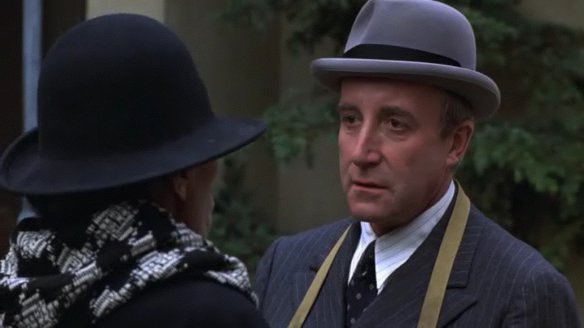Last week I wondered about whether Mitt Romney, like Faustus, is losing his center as he campaigns to be the Republican nominee for president. I have to admit, however, that all presidential candidates must function, to a degree, as points of projection. We look at all of them and see what we want to see. Or (when the projections are negative) what we hate.
The quintessential novel about this phenomenon is Jerzy Kosinski’s Being There. People project wisdom, authority, sex appeal, and any other number of other images onto Chance, who is the simple-minded gardener of a rich man who has died. No longer protected, Chance is forced to fend for himself in the world and, without any apparent effort, does very well. By the end of the book, as I recall, Chance (or “Chauncey Gardener,” as people have come to know him) is well on his way to becoming president of the United States.
I think that, to an extent, some disillusion with the politicians upon whom we have projected is inevitable. While running, Obama appealed to both leftist progressives and conservative moderates so how could there not be some disenchantment? Ronald Reagan threaded his own needle and now people look back and have wide disagreements about who he was.
This isn’t to say that Obama (or Reagan, for that matter) is as empty as Chance, however. He appears to have a core set of beliefs, even though he is (depending on how you view him) either pragmatic or Machiavellian in how closely he clings to them. He ran as a center-left Democrat and that’s pretty much how he has governed.
I’d say that there is also a fairly consistent core to most of those Republicans running for president. With some of them, most notably libertarian Ron Paul, we see the drawbacks of too much purity, too much of one-solution-fits-every-situation. Some, like Michele Bachmann, have a crazy core. But they have cores. The only exception is Mitt Romney.
In this respect Romney seems the most like Chance. But Chance at least seems genuine whereas (as Andrew Sullivan of the Daily Dish once observed in an article entitled “The Ineffable Strangeness of Mitt Romney”) the former Massachusetts governor makes plastic seem real. Kudos to Walter Shapiro of The New Republic for using a Catcher in the Rye allusion to capture the Romney phenomenon:
The entire Romney clan was arrayed in such an orderly formation on stage—with minimal fidgeting from the grandchildren—that it brought to mind the middle-aged man seated behind Holden Caufield at Radio City Music Hall and marveling over the Rockettes, “You know what that is? That’s precision.”
Of course, we all know what Holden’s favorite epithet is for people he doesn’t respect.
Because Romney doesn’t seem to be the stuff of which dreams are made, he is having difficulty performing as the point of projection for Republicans. That’s how he’s different from Chance, who at least seems authentic. Perhaps certain Republicans in the financial wing of the party see themselves in Romney and assume he’s faking it (and think they recognize the necessity of his doing so) when he tries to talk like a rightwing man-of-the-people populist. But such populists also think he’s faking it, which is why they are desperately looking for alternatives.
In that way, Romney is very much like another Massachusetts politician. My novelist friend Rachel Kranz, when she was campaigning for John Kerry in 2004, said she detected resignation, not excitement, in his Democratic supporters. She knew then he was in trouble.
In past posts, I’ve compared Romney to Eliot’s Hollow Men, form without substance who behave as the wind behaves. I’m also tempted to quote Gertrude Stein and ask if there is “any there there.” (Stein said this about Oakland, California.) But maybe the fault is in us. Perhaps we have forced someone who was a decent politician to disavow his political past, someone who was (and still is) a nice guy to act nasty. What if we were all to decide to look only at someone’s basic competence and make our judgments on his policies, not on how he comes across on television.
Of course, I sound like a technocrat when I say that, one who thinks that voters can be approached rationally. That vision has its limitations since we are none of us entirely rational, including intellectuals and technocrats. So as worried as I am about how a Romney presidency would exacerbate divisions of wealth in this country, I’m willing to give him some slack as far as his personality goes. I withdraw the hollowness and soullessness comments. He’s a moderate doing his best to appeal to a party that, for the moment, has been taken over by the extreme right.



3 Trackbacks
[…] the use of literature. In the past I’ve wondered if Romney is a Faustus who has sold his soul, a Chauncey Gardener (from Jerzy Kosinski’s Being There) who serves as a point of projection, or (in the same post) […]
[…] –Chauncey Gardener, Holden Caulfield, and Oakland (“no there there”) […]
[…] –Chauncey Gardener and Oakland (“no there there”) […]